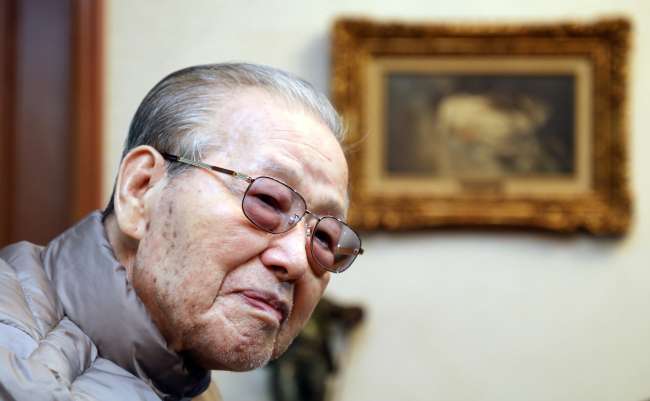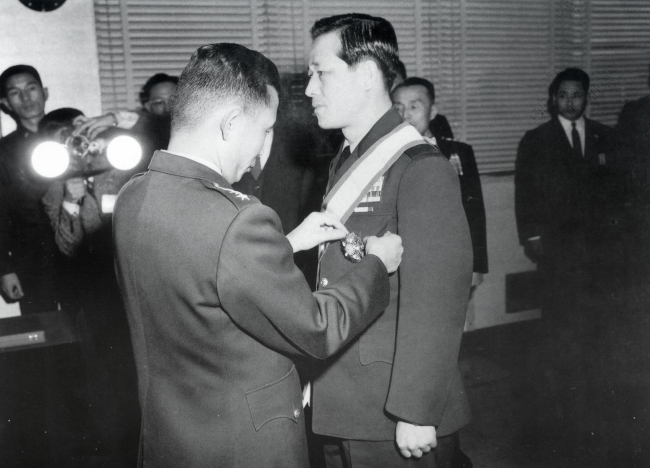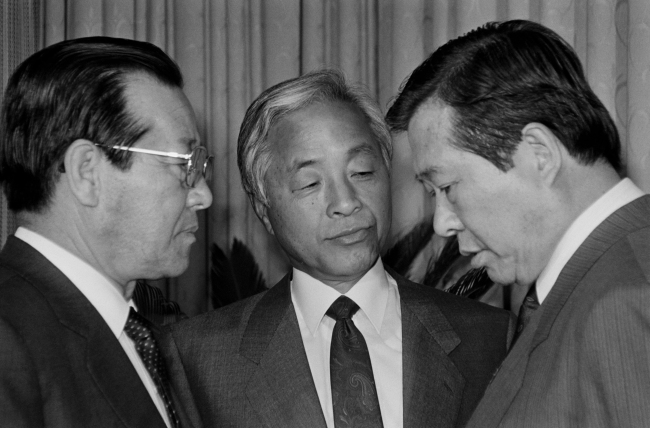Kim Jong-pil, who passed away on Saturday at the age of 92, was a seemingly ever-present figure in Korean politics, whose influence has been felt since the early 1960s.
Kim was a two-time former Prime Minister, the founder of the country’s spy agency and widely-known as the “perennial No. 2 man” in modern Korean politics. He was 92.
Kim was transferred from his home to Soonchunhyang University Hospital in Seoul and was declared dead upon arrival at 8:15 a.m., according to the hospital. He is believed to have died of complications due to old age.

Kim Jong-pil (Yonhap)
Born in 1926, Kim graduated from the Korea Military Academy and played a key role in the 1961 military coup that brought Maj. Gen. Park Chung-hee into power. Park ruled the country as president for 18 years until his assassination in 1979.
During Park’s rule, Kim founded and led the Korean Central Intelligence Agency, a predecessor of the National Intelligence Service. Kim also went on to serve two terms as prime minister, the country’s No. 2 post, first from 1971-1975 and then from 1998-2000.

Park Chung-hee (left) and Kim Jong-pil (right) in 1963 (Yonhap)
He was considered one of South Korea’s most influential politicians of the 1980s-90s, being one of the “three Kims,” to dominate local politics together with former Presidents Kim Young-sam and Kim Dae-jung.
Kim Jong-pil is remembered as a “perennial No. 2 man” who played a key role in helping many politicians rise to power, despite failing to become the top leader himself.
Related to Park Chung-hee by marriage, Kim entered politics by taking part in Park’s 1961 military coup, and served as his right-hand man for much of his rule with hopes of becoming his successor.
But after Park’s assassination, a new military junta led by Gen. Chun Doo-hwan seized power through a “counter-coup” in 1979. And Kim was exiled to the US, accused of corruption and forced to surrender much of his assets.
Kim returned to South Korean politics after Chun was pressured by a string of mass demonstrations for democracy, to allow Korea’s first-ever free, direct presidential election in 1987.

Kim Jong-pil (left), Kim Young-sam (center) and Kim Dae-jung (right) in 1998 in Seoul (Yonhap)
That year, Kim founded his own conservative party and ran in the 1987 election against Chun’s former army colleague Roh Tae-woo and two opposition candidates: Kim Dae-jung and Kim Young-sam.
Roh won the election due to a split in opposition votes. Kim Jong-pil placed fourth in the election. And in the years ahead, these “three Kims” would come to dominate local politics.
Leveraging his political influence, Kim Jong-pil played kingmaker to help Kim Young-sam win the 1992 presidential election and contributed to Kim Dae-jung’s success in the 1997 presidential election.
Over these years, Kim Jong-pil was a 9-term legislator, the longest for any South Korean politician. He resigned from politics in 2004.
By Sohn Ji-young (
jys@heraldcorp.com)



![[AtoZ into Korean mind] Humor in Korea: Navigating the line between what's funny and not](http://res.heraldm.com/phpwas/restmb_idxmake.php?idx=645&simg=/content/image/2024/04/22/20240422050642_0.jpg&u=)

![[Exclusive] Korean military set to ban iPhones over 'security' concerns](http://res.heraldm.com/phpwas/restmb_idxmake.php?idx=645&simg=/content/image/2024/04/23/20240423050599_0.jpg&u=20240423183955)

![[Herald Interview] Why Toss invited hackers to penetrate its system](http://res.heraldm.com/phpwas/restmb_idxmake.php?idx=645&simg=/content/image/2024/04/22/20240422050569_0.jpg&u=20240422150649)
![[Graphic News] 77% of young Koreans still financially dependent](http://res.heraldm.com/phpwas/restmb_idxmake.php?idx=645&simg=/content/image/2024/04/22/20240422050762_0.gif&u=)